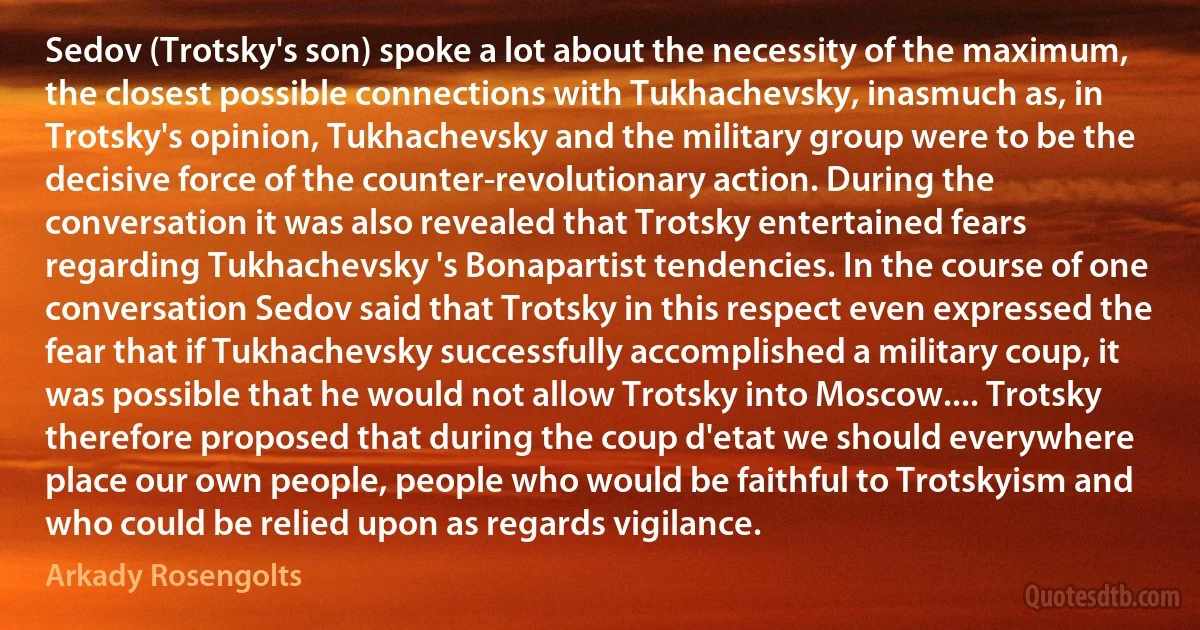
Sedov (Trotsky's son) spoke a lot about the necessity of the maximum, the closest possible connections with Tukhachevsky, inasmuch as, in Trotsky's opinion, Tukhachevsky and the military group were to be the decisive force of the counter-revolutionary action. During the conversation it was also revealed that Trotsky entertained fears regarding Tukhachevsky 's Bonapartist tendencies. In the course of one conversation Sedov said that Trotsky in this respect even expressed the fear that if Tukhachevsky successfully accomplished a military coup, it was possible that he would not allow Trotsky into Moscow.... Trotsky therefore proposed that during the coup d'etat we should everywhere place our own people, people who would be faithful to Trotskyism and who could be relied upon as regards vigilance.
Arkady RosengoltsRelated topics
action conversation coup course faithful fear force maximum necessity opinion people place possible respect say should son spoke vigilance counter-revolutionaryRelated quotes
WHAT HAPPENS AFTER DEATH?
When a human soul goes out of the body, some great mystery happens. For if it is guilty of sins, then there come hordes of demons, evil angels and dark forces, take that soul and drag it to their side.
No one should be surprised at that, because if a man surrendered and fell prey to them while still alive in this world, will not they have even greater control over him and enslave him when he departs from this world?
As for the other, the better part of people, something different happens to them. There are Angels around the holy servants of God in this life; the holy spirits surround them and protect them; and when their souls are separated from the body, the choir of Angels welcomes them into their fellowship, into a bright life, and thus leads them to the Lord.

Macarius of Egypt
But the spirit which they so nobly represented two generations ago has not departed from the land. It was resurgent in the days of 1898 and in 1917, and finds a lineal succession in the three branches which make up the land and sea forces of the present day and in the public opinion of the people. Our country has never had a better-equipped army or a more efficient navy in time of peace than it has at the present time. The Air Service is being perfected, better quarters are being provided, and our whole Military Establishment is being made worthy of the power and dignity of this great Nation. We realize that national security and national defense can not be safely neglected. To do so is to put in peril our domestic tranquility and jeopardize our respect and standing among the other nations.

Calvin Coolidge
The Philosopher of this age is not a Socrates, a Plato, a Hooker, or Taylor, who inculcates on men the necessity and infinite worth of moral goodness, the great truth that our happiness depends on the mind which is within us, and not on the circumstances which are without us; but a Smith, a De Lolme, a Bentham, who chiefly inculcates the reverse of this,-that our happiness depends entirely on external circumstances; nay, that the strength and dignity of the mind within us is itself the creature and consequence of these. Were the laws, the government, in good order, all were well with us; the rest would care for itself! Dissentients from this opinion, expressed or implied, are now rarely to be met with; widely and angrily as men differ in its application, the principle is admitted by all.

Thomas Carlyle
Always to me any aroused group was a good group, and therefore I accepted an invitation to talk to the women's branch of the Ku Klux Klan at Silver Lake, New Jersey, one of the weirdest experiences I had in lecturing. [...] Never before had I looked into a sea of faces like these. I was sure that if I uttered one word, such as abortion, outside the usual vocabulary of these women they would go off into hysteria. And so my address that night had to be in the most elementary terms, as though I were trying to make children understand. In the end, through simple illustrations I believed I had accomplished my purpose. A dozen invitations to speak to similar groups were proffered. The conversation went on and on, and when we were finally through it was too late to return to New York.

Margaret Sanger
He is firm in constitution, as in resolution; industrious, indefatigable, determined and persevering; fixed in opinion, and unbiased in judgment; not over accessible, but studious to reward merit. He is a rock against which the waves of calumny and malice, moved by the gusts of passion natural to envy, have dashed; have washed its sides: he is still immovable on his base. He is in some degree susceptible of adulation, as is every man who has an honest thirst for military fame. He endures fatigue and hardship with fortitude uncommon for a man of his years. I have seen him, in the most severe night of the winter of 1794, sleep on the ground, like his fellow-soldiers, and walk around the camp at four in the morning, with the vigilance of a sentinel.

Anthony Wayne
